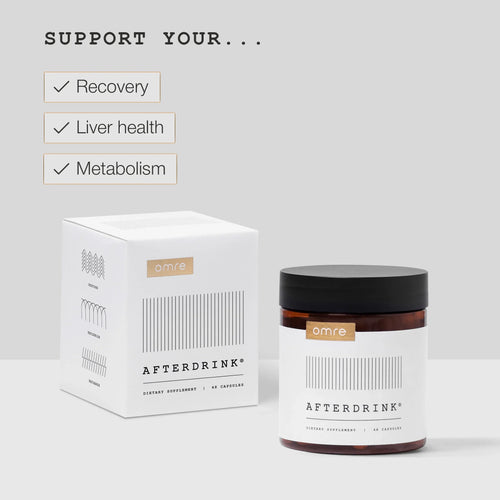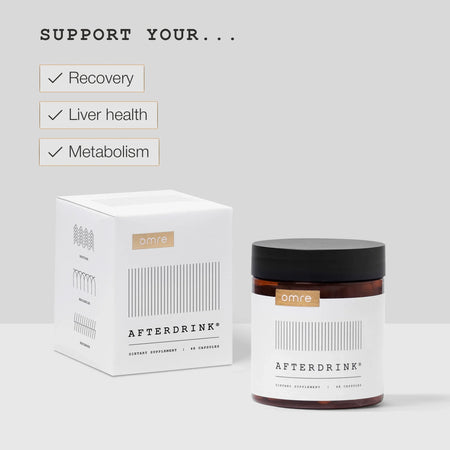Table of Contents
How do you stop puking from a hangover? If you're on this page, chances are you're having a rough morning.
It's a surprisingly common question that has a challenging answer.
Vomiting (or puking) when hungover is probably one of the worst symptoms of a hangover. And if you've ever been unfortunate enough to experience it, you'll know that you'd do anything to make it stop.
In this article, we'll examine the causes of puking when hungover and then focus on everything you can do to help you stop and recover.
Afterdrink®
A supercharged antioxidant designed to support recovery, made from the very best, research-backed ingredients on the market.*
IS IT NORMAL TO THROW UP WHEN HUNGOVER?
Yes, it is normal to throw up when hungover. Vomiting is your body’s way of expelling toxins, like alcohol, that irritate the stomach lining and disrupt digestion. However, excessive vomiting can lead to dehydration and electrolyte imbalances, so it’s important to rehydrate and rest.
PUKING WHEN HUNGOVER: WHY DOES IT HAPPEN?
Puking while you're drinking is different from puking when you're hungover. That's because the latter usually occurs in the morning after a night out. At this point, your blood alcohol levels should be low or close to zero.
Hangover symptoms typically start when your blood alcohol concentration reaches close to zero. (1)
This explains why the hair of the dog method of supposedly "curing" a hangover (i.e., drinking more alcohol) can delay hangovers. But it's a surefire way of guaranteeing an even worse hangover later, so it's best avoided!
Suppose you start puking on a night out because you've had too many drinks. In that case, it's an early sign of alcohol poisoning as your blood alcohol concentrations are at dangerously high levels. This is an important distinction because it's very different from feeling sick after a night out when you've not had any alcohol for several hours.
There's no specific reason for puking when hungover. Instead, it's a combination of different factors that bring on nausea, which we will cover next:
- ALCOHOL CAN INCREASE STOMACH ACID PRODUCTION
Some studies suggest that alcohol stimulates the cells in your stomach to produce more acid. It partly explains why some experience heartburn after drinking. (2)
- ALCOHOL CAUSES INFLAMMATION OF THE STOMACH LINING
Alcohol is a toxin. It's an irritant and inflames the stomach lining, leaving it fragile and delicate. (3) Chronic alcohol exposure can lead to conditions like gastritis, which increases your risk of ulcers, acid reflux, and other gastrointestinal issues.
- ALCOHOL CONTAINS CONGENERS
Darker-colored drinks such as bourbon and red wine contain higher concentrations of congeners. These naturally occurring by-products give these types of alcohol their distinctive aroma and taste. Unfortunately, they also make hangovers a lot worse by fuelling inflammation. Some people are susceptible to congeners, including tannins, esters, and acetone, and this may trigger an upset stomach after drinking. You can read more about this in our article about congeners.
- ALCOHOL SLOWS DOWN GUT MOTILITY
Alcohol prolongs "gastric emptying." In simple terms, it slows down how fast your gut works. As a result, food sits in your stomach for longer. (4)
- ALCOHOL DEHYDRATES YOU
Alcohol acts as a diuretic, causing significant fluid loss that can lead to dehydration. Dehydration not only exacerbates your hangover symptoms like fatigue and headaches but can also damage your kidneys if your dehydration is severe.
IN SUMMARY: THE REASONS FOR PUKING WHEN HUNGOVER ARE MULTIFACTORIAL. THIS MEANS IT'S USUALLY NOT A SINGLE CAUSE BUT RATHER A COMBINATION OF FACTORS, INCLUDING INFLAMMATION AND IRRITATION CAUSED BY ALCOHOL AND ITS BY-PRODUCTS.
HOW TO STOP PUKING FROM A HANGOVER
Now that we've covered the science, we can concentrate on everything you can do to stop puking when hungover.
If you're feeling nauseous, there are a few things you can do to try and settle your symptoms:
- HAVE AN ICE LOLLY
Have you ever been told to get some "fresh air" or open a window if you're queasy? Although it still needs to be understood entirely why this helps, studies have shown that exposure to cold helps. (5)
Some researchers have given ice lollies instead of anti-sickness medications to people experiencing nausea from anesthetic agents following surgery. They found ice pops work just as well as medicines. (6)
You could also try sucking on ice as an alternative. This will have a soothing effect and hydrate you slowly.
- EAT GINGER
Ginger is a research-backed natural anti-sickness remedy. Making ginger tea or taking ginger supplements could help settle your symptoms. It depends if you can hold it down in the first place and whether you like the taste of ginger!
- EAT PEPPERMINT
Studies have shown that peppermint can settle upset stomachs. It's commonly used to help with abdominal cramps, which you may have if you've been puking.
- TRY ACUPRESSURE
Although it's a contentious area of science, some (albeit limited) evidence shows that acupressure can reduce nausea. In any case, it's easy to try and has no real downsides.
- STAY HYDRATED
Drinking water slowly and consistently can help alleviate your hangover symptoms, including nausea. It also helps to counteract the dehydration caused by alcohol's diuretic effects. Sip electrolyte-rich drinks to restore lost minerals and prevent severe dehydration.
- REST AND RECOVERY
Allow your body time to recover. Rest helps your body process and eliminate the remaining toxins. Sleep can also help ease your discomfort and fatigue.
THINGS TO AVOID
Now that we've discussed everything you can do to help you stop puking when hungover, it's important to discuss some things you should also avoid.
- EATING
Eating food if you're puking or feeling nauseous when hungover should be avoided. It may seem logical, but it's unlikely to help and could worsen matters.
It's best to wait until you're feeling better to start eating again. Instead of trying to eat, you could sip on a sugary drink to boost your sugar levels and provide your body with some fuel.
- MAKING YOURSELF PUKE MORE
You may have heard that making yourself puke even more is good for ridding your body of "toxins." However, there is no scientific basis for this. There is absolutely no need to make yourself puke when hungover, and it will only do more harm. Intentional vomiting increases the risk of esophageal tears, acid reflux, dental damage, and aspiration, where vomit enters your lungs, potentially leading to pneumonia.
Afterdrink®
A supercharged antioxidant designed to support recovery, made from the very best, research-backed ingredients on the market.*
IS PUKING GOOD FOR A HANGOVER?
Puking when hungover causes further stress on your body because you'll be losing more fluid and electrolytes from your stomach.
Forcing yourself to puke is not recommended and will make matters worse. In some cases, it can even be dangerous, as forceful and unnecessary vomiting can tear small blood vessels in your stomach and esophagus, causing bleeds.
ANYTHING ELSE TO CONSIDER?
If you're puking when you've got a hangover, it's a good sign from your body that you've had way too much for your body to handle. The best way to prevent it from happening in the future is to reduce your alcohol intake.
Eating before drinking and ensuring you're adequately hydrated throughout the night can also help. Consuming drinks with lower levels of congeners, like vodka or gin, and alternating with water between alcoholic drinks can minimize the severity of your hangover.
It's also important to remember that puking can signify other illnesses, such as food poisoning. If you puke persistently throughout the day, it's a sign that it may not just be from your hangover. At this point, getting on the phone with your doctor is essential.
SIGNS OF SEVERE DEHYDRATION
Prolonged vomiting or an inability to retain fluids can lead to dehydration, which is characterized by dizziness, dark urine, and or infrequent urination. If you’re experiencing any of these symptoms, seek immediate medical attention to prevent serious complications.
PUKING WHEN HUNGOVER – FINAL WORDS
That concludes our investigation into why hangovers cause some people to puke and what you can do to prevent it.
We've walked you through the basic things that you need to know about why drinking too much can cause you to puke when hungover. In addition, we've gone through some things to avoid and prevent things from worsening.
Suppose your puking is persistent throughout the day. In that case, it's a reason to think twice about blaming only the hangover as a cause. In this case, you should speak to your doctor for advice.





